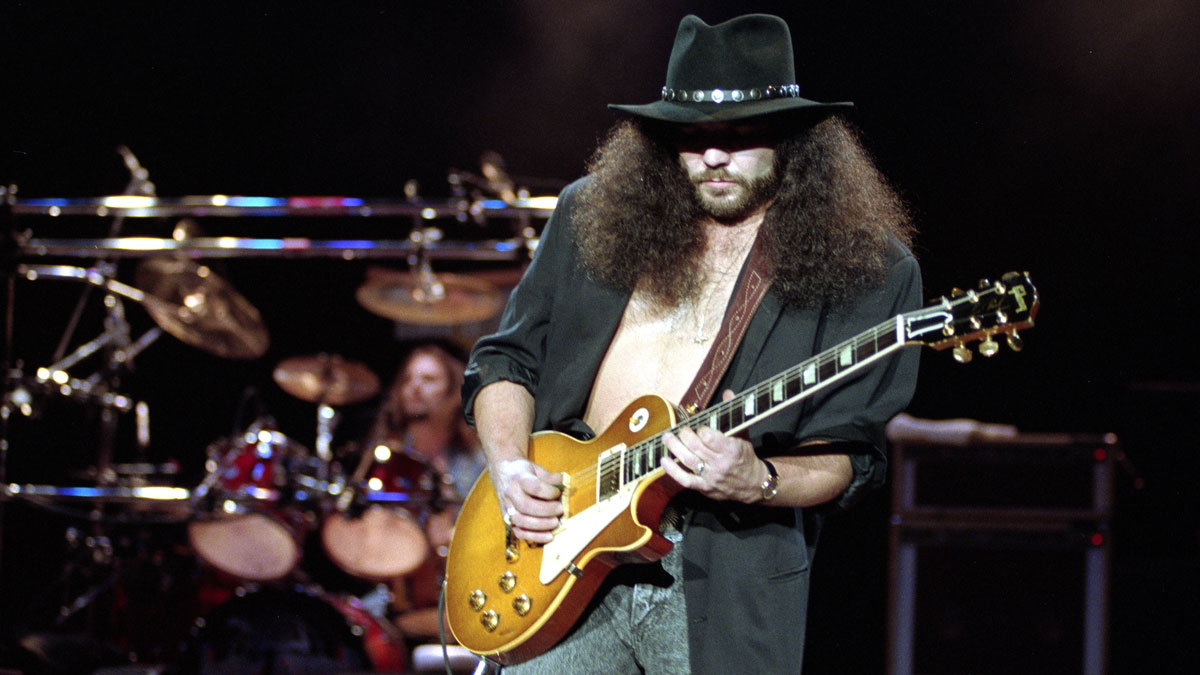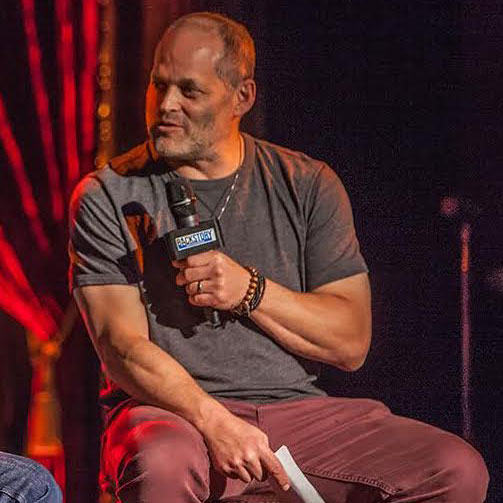Gary Rossington recalls the making of 10 landmark Lynyrd Skynyrd tracks: “The more wild experiences you have the better songs you can write”

As we commemorate the life of Southern rock guitar great Gary Rossington, who has died aged 71, we are unearthing some of his most memorable conversations with Guitar World. This feature was first published online in March 2009.
“We used a lot of D-C-G progressions,” Lynyrd Skynyrd guitarist Gary Rossington says with a shrug and a laugh about his band’s songwriting process. “There’s only seven chords, so you got to use the same ones over and over. It’s all in what you do with them. I could write a dozen different songs with the same three or four chords but they’d all be entirely different.”
Rossington and company certainly have always had a knack for doing a lot with a little. For while Skynyrd are renowned for their aggressive, three-guitar attack and the seemingly endless soloing such a lineup inevitably produces, what’s really made Skynyrd a staple of classic rock radio is their songs: instantly memorable four-minute rockers like Sweet Home Alabama, Gimme Three Steps and What’s Your Name, as well as extended ballads such as Simple Man, Tuesday’s Gone and, of course, Free Bird.
Remarkably, the latter, one of rock’s most-played, best-loved songs, was one of the first songs Lynyrd Skynyrd ever wrote – penned when singer Ronnie Van Zant and guitarists Allen Collins and Gary Rossington were still in their teens.
Like virtually all of their material, Free Bird was written as a collaboration between Van Zant and one the group’s guitarists. This loose but consistent formula served Skynyrd extremely well, producing classic songs which quickly made them one of the nation’s most popular bands.
By 1975, however, when third guitarist Ed King left the group suffering from burnout, Skynyrd had fallen into a bit of a creative rut, as reflected by Gimme Back My Bullets, an unusually flaccid affair. Before anybody could write the band’s epitaph, however, they added guitarist Steve Gaines, whose songwriting and phenomenal playing infused them with a new energy.
The rejuvenated band shines on 1976’s live One More for the Road and the following year’s Street Survivors. The latter is one of the best-arranged and played guitar albums in rock history.
Get The Pick Newsletter
All the latest guitar news, interviews, lessons, reviews, deals and more, direct to your inbox!
Tragically, before the group could reap the fruits of this rebirth, their chartered plane crashed into a Mississippi swamp on October 20, 1977, killing three members –including Gaines and Van Zant – seriously injuring everyone else and seemingly forever putting an end to the group.
A decade later, the surviving members of the group got together for a “Tribute” tour with Van Zant’s brother, Johnnie, taking over as vocalist. Enthusiastic audience response led to a full-time reunion, which has produced numerous albums, including 2003’s Vicious Cycle (Sanctuary). Here, Rossington recalls the origins of some of the band’s best-loved tunes.
1. Free Bird
Album: (Pronounced 'Lĕh-'nérd 'Skin-'nérd) (1973)
“I don’t remember that one. Could you sing it for me? Oh, okay. Allen had the chords for the beginning, pretty part for two full years. We were just beginning to write – that was actually one of the first songs we ever completed – and Ronnie kept saying that there were too many chords so he couldn’t find a melody for it. He thought that he had to change with every chord change. We kept asking him to write something to these chords and he kept telling us to forget about it!
“Then one day we were at rehearsal and Allen started playing those chords, and Ronnie said, ‘Those are pretty. Play them again.’ Allen played it again, and Ronnie said, ‘Okay, I got it.’ And he wrote the lyrics in three or four minutes – the whole damned thing! He came up with a lot of stuff that way, and he never wrote anything down. His motto was if you can’t remember it, it’s not worth remembering.
Everybody told us that we were crazy to put the song on our first album, because it was too long. Our record company begged us not to include it
“So we started playing it in clubs, but it was just the slow part. Then Ronnie said, ‘Why don’t you do something at the end of that so I can take a break for a few minutes.’ So I came up with those three chords at the end and Allen played over them, then I soloed and then he soloed. It all evolved out of a jam one night.
“So we started playing it that way, but Ronnie kept saying, ‘It’s not long enough. Make it longer.’ Because we were playing three or four sets a night, and he was looking to fill it up. Then one of our roadies told us we should check out this piano part that another roadie, Billy Powell, had come up with as an intro for the song. We did – and he went from being a roadie to a member right then.
“Everybody told us that we were crazy to put the song on our first album, because it was too long. Our record company begged us not to include it. And when it first came out, they did all kind of awful edits until it got big enough where it didn’t matter any more. It humbles us to think that it’s been played so much – and it’s still played. But it’s not magic – it’s still just a song to us.”
2. Gimme Three Steps
Album: pronounced leh-nerd skin-nerd (1973)
“This is another true story. Ronnie went into a bar to look for someone and me and Allen were too young to get in so were waiting for him outside, and we were waiting and waiting, then he came running out with a big ol’ guy chasing him, yelling.
“He had started dancing with this chick and this guy came in and was going to beat him up and Ronnie said, ‘Just give me three steps and I’m gone.’ The guy had a gun and he was a redneck and he was drunk – a nasty combination of things – and Ronnie said, ‘If you’re going to shoot me, it’s going to be in the ass or in the elbow.’ And he took off like a bat out of hell.
“We got in the car and split and he told us what happened and we were laughing and we kind of wrote the song right there, drove over to Allen’s house, got his guitar and finished it.
“The more wild experiences you have the better songs you can write. I’m not necessarily proud of everything we ever did, but that’s just true. We always just considered ourselves a working-man’s band and thought every song should tell a story that people could relate to. When we finish a song, you know what it’s about, whereas some groups have songs you may dig but not understand. I think that’s why our songs have lasted as long as they have.”
3. Sweet Home Alabama
Album: Second Helping (1974)
“I came up with the banjo/steel guitar part – it’s just a fingerpicked D, C, G progression – and the little opening riff, which I kept playing over and over again. Ronnie started writing lyrics at rehearsal one day and saying, ‘Play that again. Play that again.’ And after about an hour he had all the words. Then Ed [King] took it home and put in all the little fills and licks and arranged it.
“It was basically a joke song. We used to travel through Alabama a lot and get onto back roads and just marvel at how pretty it was and how nice the people were. And Neil Young was, and still is, one our favorite artists, so when he came out with Southern Man and Alabama, criticizing the South, we said, ‘Well, what does he know? He’s from Canada!’ So we threw that line about him in there. We were told by some people to take out the parts about Neil Young and [former Alabama governor] George Wallace, but we said, ‘Hey, it’s just a song. And we’re going to record it the way we wrote it.’
“Most of our songs come through us. It either happens real quick or it doesn’t happen at all. Actually, Ronnie wrote most of his lyrics either driving around Jacksonville checking out different neighborhoods – especially poor ones, black and white – or in the shower.
“You know how people sing in the shower? Well, Ronnie did that, but he made up songs – melody, verse, chorus, bridge and all. Many times when we were on the road, he’d end up running into my room with a towel around his waist, dripping wet, saying, ‘Check this out. Write some music to that real quick.’ So I’d try to write a few chords to get a rough idea of where the song was going, then either Allen or Ed or I would go back and finish the song.”
4. Call Me the Breeze
Album: Second Helping (1974)
“We always liked J.J. Cale and we heard Breeze one night sitting around the house and Ronnie said, ‘Let’s do that!’ But it didn’t work the way he did it – a real straight shuffle – so I wrote the arrangement, which was completely different. If we had changed the lyrics, it would have been a completely different song. We did the same thing to Merle Haggard’s Honky Tonk Night Man.”
5. Crossroads
Album: One More For The Road (1976)
“We did that as a tribute to Cream, one of our all-time favorite bands. We saw them on their Farewell tour and they completely blew our minds, so we made this a regular part of our set. In fact, it was our encore for years, until Free Bird became so big that we basically had to do that last.
“By the time we recorded the live album, it had been such a part of our set for so long that we felt we had to include it. Also, our producer, Tom Dowd, engineered the Cream version and he told us the story about how it came together, and that really inspired us to want to re-record it.”
6/7. I Know a Little / You Got That Right
Album: Street Survivors (1977)
“I think these two songs sum up what Steve Gaines meant to the band. He wrote both of them and sang You Got That Right as a duet with Ronnie. He was a great songwriter and singer – and an incredible guitarist. I’ve never heard anybody, including any of us, play the picking he did on I Know a Little quite right.
“Steve had a lot to do with the writing and arrangements throughout this album and his playing was so good it really inspired us. When he joined, we were kind of an in a lull. We were still doing well – selling a lot of tickets and records – but the music was getting a little boring to us. We needed a little spark of inspiration, and Steve provided it. We started getting together and jamming at night. It put us back in the frame of mind we had had at the beginning.
“Steve was so good, he was a freak of nature. He used to piss us off because he could do so many things that me and Allen couldn’t. Every time I ever went to his house or his hotel room, he had his black Les Paul on. He’d order room service and eat with his guitar on. He’d sit around and talk and not play it for an hour, but it would be strapped on. He’d watch TV with it on, play it during commercials, then stop. It was like his third arm.”
8. Honky Tonk Night Time Man
Album: Street Survivors (1977)
“This is a Merle Haggard song, which we did to show our love for him and for country music in general. Steve played an incredible solo here also, and it was a live first take.
“We only knew that it was a G progression and he went out and played a mind-boggling solo. He didn’t even hardly know the song, but he played the shit out of it. We were standing in the control room with our jaws dropped, and he strolled in and said, ‘How’d I do?’ We told him to go home and call it a day, because we knew it couldn’t get any better.”
9. What’s Your Name
Album: Street Survivors (1977)
“Me and Ronnie were just sitting in a hotel room one night and I had those chords which I had just written that day. And he right off the bat started singing. The original lyrics were, ‘It’s eight o’clock and boy is it time to go.’ Ronnie had just gotten an itinerary from his brother Donnie, who was in .38 Special and their first stop was Boise, Idaho. So Ronnie changed the first line to ‘It’s eight o’clock in Boise, Idaho,’ which immediately made it a real on-the-road song.
“But it’s all basically a true story. One of our road crew got in a fight at a bar with one of the hotel guests and they kicked us out, and we said we’d leave if they’d send a bottle of champagne to our room. It’s just about being young and free – 21 and unmarried. We’d go to a town and meet a chick, then forget her name. And when you’d come back to town, you’d say, ‘What was your name, honey?’”
10. The Last Rebel
Album: The Last Rebel (1993)
“This is a very moody song. We had to really get in the mood to record it, then we just cut it live. I wrote the music and named it at my house in Wyoming. Then Johnnie and Michael Lunn and Robert Johnson wrote the lyrics. The first verse is about a civil war soldier and the second verse is about me, they say, and the third verse is sort of about us – the last rebels, out on the road, still doing our thing.
“It’s one of my favorite songs to do live, which is a good sign – it really holds up with our old material. When I see it on our set list, I go, ‘All right.’ But we never get sick of playing any of our songs, because of the adrenaline we get from the audience’s response.”
Alan Paul is the author of three books, Texas Flood: The Inside Story of Stevie Ray Vaughan, One Way Way Out: The Inside Story of the Allman Brothers Band – which were both New York Times bestsellers – and Big in China: My Unlikely Adventures Raising a Family, Playing the Blues and Becoming a Star in Beijing, a memoir about raising a family in Beijing and forming a Chinese blues band that toured the nation. He’s been associated with Guitar World for 30 years, serving as Managing Editor from 1991-96. He plays in two bands: Big in China and Friends of the Brothers, with Guitar World’s Andy Aledort.











